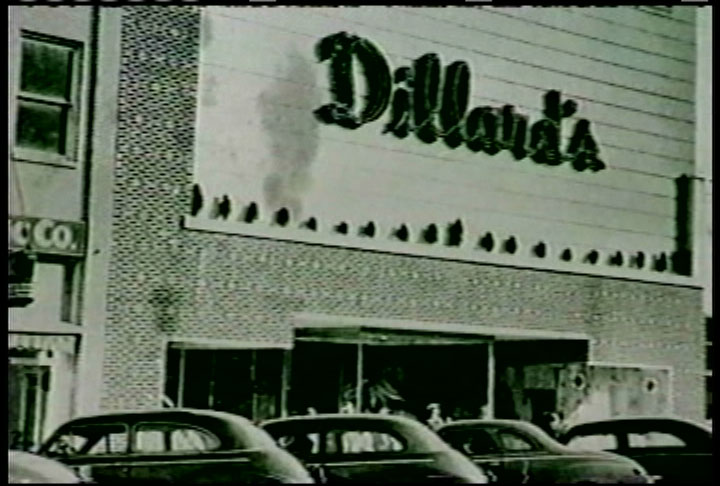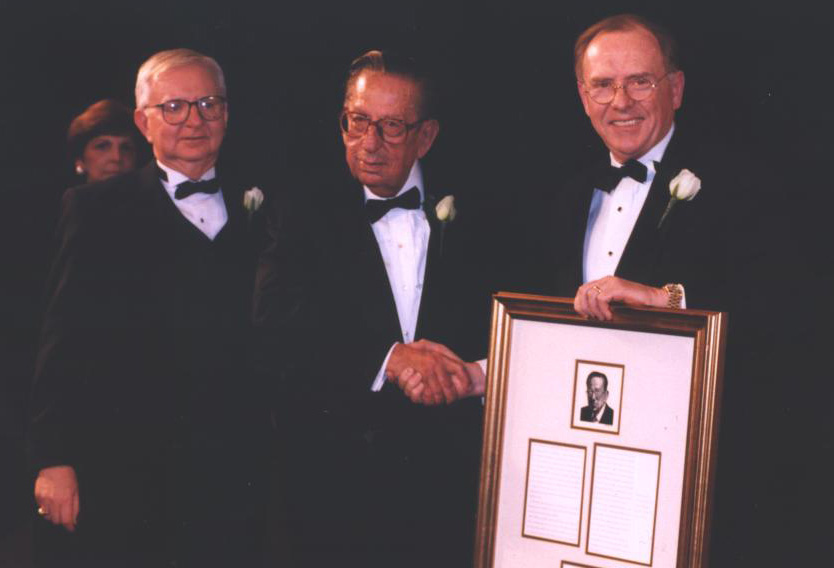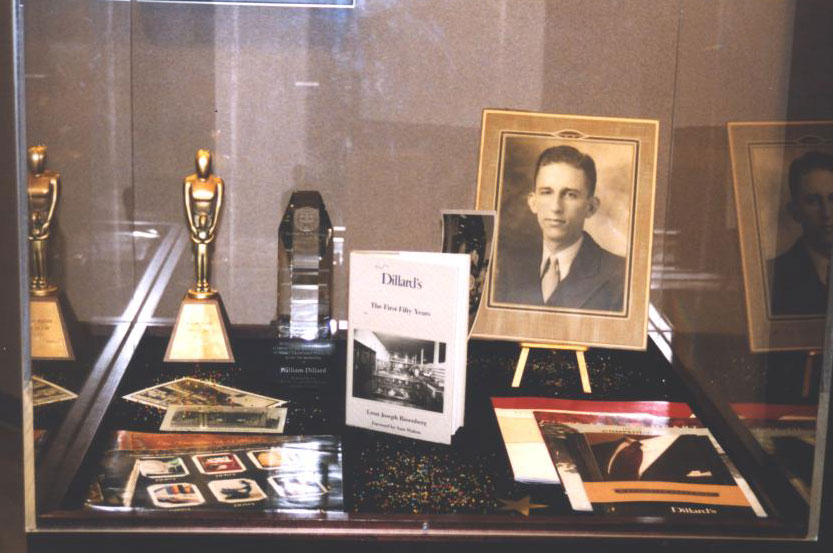
How William T. Dillard Built a Family Legacy Into a Retail Empire
This is one of a series of stories looking back on the life and legacy of the leaders inducted into the Arkansas Business Hall of Fame in its first class in 1999.
William Thomas Dillard was only 23 in 1938 when he borrowed $8,000 from his father, moved to Nashville, Arkansas, and opened his first clothing store.
The timing was dubious. The Great Depression had battered the economy for nearly a decade, World War II loomed and it seemed unlikely that a town of around 2,500 people could sustain another retailer.
On the other hand, he had a background that suggested success would follow.
For starters, his family had a history of turning risks into profits. In fact, he could trace his heritage back to 1650 when George Dillard left England for Virginia at the age of 16 and began acquiring land.
Eventually, some of his ancestors made their way westward, where they were successful as farmers and, later, as merchants. Dillard’s parents owned farmland and operated a mercantile store in Mineral Springs, Arkansas, and he began working there on afternoons and weekends when he was 12 years old.
Dillard also excelled academically, graduating from high school when he was 16 and earning a bachelor’s degree in accounting from the University of Arkansas and an MBA from Columbia University. And he worked part-time jobs in retail while in New York and then went through a management program with Sears.
Indeed, the obstacles that stood in Dillard’s way in 1938 were no match for the budding entrepreneur. The Nashville T.J. Dillard’s – which used the same name as his parent’s store in Mineral Springs – brought in $42,000 in revenue and $3,000 in profit in its first year.
In 1940, Dillard married Alexa Latimer, who lived in Nashville and was one of the reasons he opened his first store in that town. The couple would raise five children, all of whom would become active in the business and torchbearers of a family legacy that soon outgrew southwest Arkansas.
Dillard had a healthy ambition and a vision for the future of retailing. So, unlike previous generations that thrived in mostly rural settings, he branched out until he had created one of the most successful family-run department store chains in America.
When the Nashville store reached what he felt was the limit for that market – annual sales of $340,000 by 1947 – Dillard purchased an interest in Wooten’s Department Store in nearby Texarkana. Then he sold the Nashville store in 1949, bought the remaining interest in Wooten’s and soon began acquiring stores across the south.
Dillard typically bought hometown stores that were in financial trouble and turned them around with sound management that minimized debt and aggressive local advertising that drove sales and built brand awareness and customer loyalty. Then, in 1961, he launched the Dillard Investment Company, becoming one of the first in the industry to give customers access to credit and strengthening his position with banks.

After moving from Nashville to Texarkana to Tulsa, Dillard bought the two biggest department stores in Little Rock – the Joseph Pfeifer store (in 1963) and the Gus Blass Co. (in 1964) – and relocated his family and his business back to Arkansas. The company also opened its first mall anchor store in 1964 in Austin, Texas, a move that foreshadowed the company’s growth into suburbia. And he made an early investment in centralized computer systems for tracking inventory and sales, giving Dillard’s a competitive edge with technology.
Dianna Owens Fraley summed up the success of Dillard’s strategy in the Encyclopedia of Arkansas: “A local focus, with advertisements in local media outlets and pricing strategies based on local competition, combined with its computerized inventory and sales system, enabled Dillard’s to become a cornerstone in many suburban malls and secondary markets.”
When Dillard died in 2002 at the age of 87, Dillard’s had grown into a publicly traded company with 350 stores in 29 states and had around $8.5 billion in sales.
Dillard was inducted into the Apparel Hall of Fame in 1985, received the 1989 Gold Medal for outstanding achievement from the National Retail Merchants Association and was one of the first four members inducted into the Arkansas Business Hall of Fame when it opened in 1999.

Pictured above: William T. Dillard, Arkansas Business Hall of Fame, 1999.
But his legacy extended beyond business.
Much of his philanthropy took place with little fanfare, but it has had lasting impact. Dillard’s historically has donated about 5% of its pretax profits to charity, for instance, and the company has donated more than $15.1 million to local chapters of Ronald McDonald House Charities (RMHC) since 1994. Dillard and his wife also helped establish the UAMS Chair for Geriatric Medicine, and both the company and the family have been strong supports of the University of Arkansas. The company donated $250,000 to the business college in 1984, and the school named its accounting department for Dillard in 2020 after a $10 million donation from his son, William T. Dillard II, who began making store visits as a 12-year-old and would later join his father in the Arkansas Business Hall of Fame.
“Mr. Dillard’s leadership and accomplishments in business are an inspiration to our students and faculty,” said UA Chancellor Joe Steinmetz when announcing the gift. “And the naming of this department in his honor ensures his legacy will continue to inspire our students and serve our campus for years to come.”
Dillard’s legacy also lives on in the civic and philanthropic contributions of his children and grandchildren, as well as in their ongoing contributions to the business. All of Dillard’s children hold top positions in the company, as do three of his grandchildren.

Pictured above: William T. Dillard's display at the 1999 Arkansas Business Hall of Fame.
And while changes in the retailing landscape have spelled doom for many traditional department stores and challenged Dillard’s, as well, the company’s 80-plus year history of operating with integrity and a conservative financial philosophy has helped it remain a competitive player in the industry, both with brick-and-mortar stores and by expanding into ecommerce.
Dillard often said, “Business without integrity is not good business—and in the long run will not be successful.” It’s one of the many principles that were passed down to him by his pioneering ancestors, a key to the company’s continued success, and the type of foundation future generations can build on for years to come.

Author:
 Stephen Caldwell is Chief Word Architect for WordBuilders, Inc., where he spends most of his time
helping clients discover, craft, and share the messages of their hearts. In addition
to writing and editing for newspapers, magazines, and on numerous book projects, he
has developed leadership and functional training for Fortune 500 companies. He lives in Fayetteville, Arkansas.
Stephen Caldwell is Chief Word Architect for WordBuilders, Inc., where he spends most of his time
helping clients discover, craft, and share the messages of their hearts. In addition
to writing and editing for newspapers, magazines, and on numerous book projects, he
has developed leadership and functional training for Fortune 500 companies. He lives in Fayetteville, Arkansas.